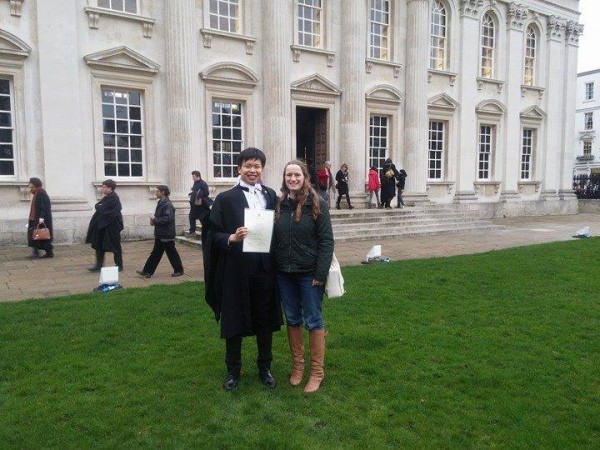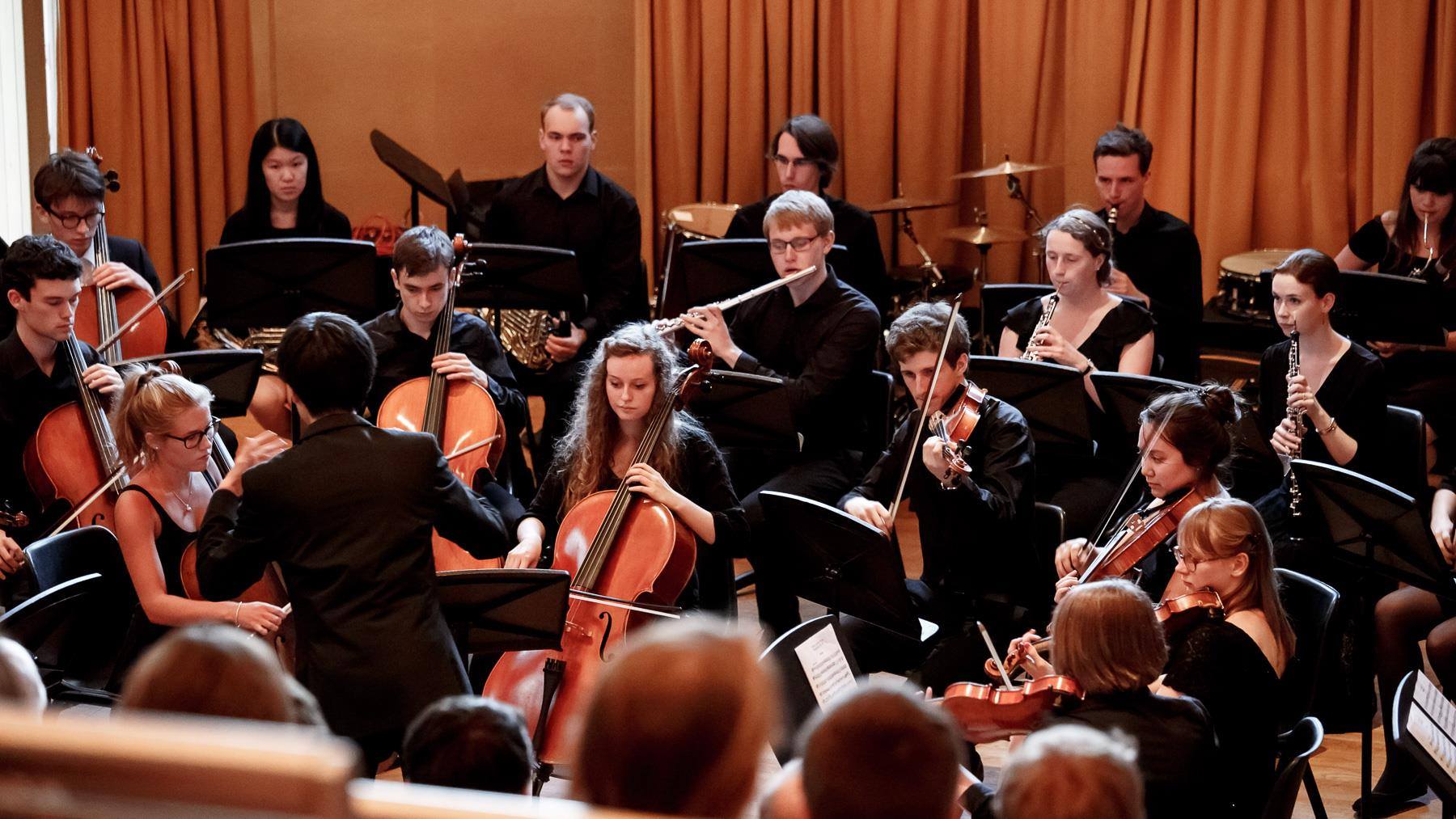 (翻譯內容以英文版本為準)
(翻譯內容以英文版本為準)
我有幸在劍橋大學、聖安德魯斯大學和杜倫大學指揮過數個交響樂團。當中,指揮音樂、研讀樂譜以及和樂手合作,都是容易且愉快的;但最困難的,是與樂團經理共事(準確來説是應付他們)。他們大部分都不負責任、雜亂無章和健忘,同時嚴重缺乏組織和領導能力。也許是經常去派對和飲酒的習慣導致他們十分平庸和無能,畢竟他們幾乎每次在綵排的時候,都是醉醺醺或宿醉的樣子。而他們從不記得自己應做的份内事,例如預訂綵排的場地、提醒樂手下次綵排的日子,還有列印樂譜。我絕對相信過量飲酒會破壞一個人的腦袋、記憶和日常運作。
不過,凡事都有例外。我曾遇過一個(亦只此一個)樂團經理是我非常樂於與之共事的,而我亦經常發自内心地向她表示敬佩和尊重,她就是 Rebecca Rebis,是我在劍橋大學時遇見的一位同學。Rebecca 與我所合作過的其他樂團經理完全不同,她有責任心、做事一絲不苟、對人感恩、有耐性、誠實且極之能幹,而且她從不説謊,或為求目的而操縱別人,她對待每個人都是非常尊重和有禮貌的。坦白說,她絕對會是一個極之差勁的政客。
我在劍橋大學所指揮的樂團,也就是 Rebecca 所管理的伊曼紐爾和基督聖體管弦樂團(Emmanuel and Corpus Christi Orchestra,亦稱 ECCO)。樂團的樂手主要來自 2 個出色的學院:伊曼紐爾學院和基督聖體學院,他們大多是高水準的人才,但我們亦偶爾會邀請來自其他學院有才能的樂手加入。每個學年我們都至少演奏 6 場音樂會,每星期至少綵排 1 次,亦經常會自我挑戰更難更刺激的曲目。

大部分大學的樂團經理都只是為了豐富自己的履歷表,或好讓自己能在同學面前自吹自擂,和享受每次綵排後的大量免費酒精,才會擔任此職。但 Rebecca 之所以會成為樂團經理,卻是因為希望把 ECCO 塑造和發展成劍橋大學最出色的樂團,並成為 2 個學院的學生都能引以為傲的交響樂團,以及令大學裡的音樂氛圍更活躍,和讓有才能的樂手一同演出和製作最高水平的表演。
樂團經理人的無數工作,從購買樂譜、影印,到預訂綵排和表演場地、編排完整的綵排時間表、(用你可以想像到最友善、最激勵人心和最受歡迎態度)提醒樂手出席綵排,還有慶功派對的後勤細節,無一不被 Rebecca 細緻入微地安排妥當。你也許覺得以上種種工作都不過稀鬆平常,但我可以肯定的說,能幹地處理這些工作殊不簡單,而且不要忘記,Rebecca 仍要專注自己繁重的學業。
在與數十個在劍橋的學生指揮傾談過後,他們一致認同 Rebecca 是萬中無一的,大家都同意說如此勤勞、有才能、有效率、完美無瑕的樂團經理,只在他們夢裡出現過。我作為一個指揮,能夠有 Rebecca 妥善處理好樂團的行政和後勤工作,就能更全心全意地專注於自己的職責和音樂的範疇上。請相信我,如果有一個無能的樂團經理,就代表指揮需要同時處理行政工作和指揮音樂,而這只會惡化我們和樂手之間的關係,並阻礙我們投入音樂。這些傷心事時常發生,不單單是我和其他樂團合作時出現過,還有其他學生指揮都經歷過。
最後還有一件事要説,Rebecca 是一個甚為出色的雙簧管手(她曾是 ECCO 的首席雙簧管手),她有著無可挑剔的高超技巧,演奏時常充滿著想像力和新鮮感,而她奏出的樂音有著完美無瑕的音調和色彩。有些樂手跟我直接説,正是她那真切且富感情的雙簧管吹奏,令他們每個星期都有動力去綵排。從綵排最初要調音(首席雙簧管手需要在綵排前吹出一個「A 音」,好讓其他樂手能夠調音),到全奏(tutti)的段落,還有優美流動的獨奏,Rebecca 的音樂才能,和對音樂的深刻理解,都令其他樂手眼前一亮。
自從我和 Rebecca 在劍橋大學畢業後,我們依然是好朋友並保持著聯繫。為了衷心地感謝她對我的支持,我為她創作了 1 首雙簧管奏鳴曲,而 1 年前她也在劍橋大學首演此曲。能夠和 Rebecca 一起工作絕對是我的榮幸,而我亦會經常欽佩她那奉獻精神、自律性和熱情。老實説,如果我未來能遇到一個樂團經理有 Rebecca 一半的專業程度,我也會大吃一驚。
My Orchestral Manager at the University of Cambridge

I have had the pleasure to conduct several orchestras at the three British universities that I have attended, namely Cambridge, St Andrews and Durham. Conducting the music, studying the scores and collaborating with the musicians were easy and enjoyable. The difficult and precarious part was in working with (or more accurately, dealing with) the orchestras’ managers. Most of them were irresponsible, messy and forgetful, as well as severely lacked organisational and leadership skills. Their mediocrity and incompetence could possibly be attributed to their drinking and partying habits – after all, they almost always turned up to rehearsals drunk or hungover and never remembered about the jobs that they should have done, like booking rehearsal venues, reminding the musicians of upcoming rehearsals and printing the musical scores. I have no doubt that excessive drinking would have damaging effects on one’s brain, memory and daily functioning.
However, everything has an exception. There was one – just ONE – orchestral manager whom I greatly enjoyed working with and would always deeply admire and respect. Rebecca Rebis, a fellow student during my time at the University of Cambridge, was utterly different to all other managers I have worked with. She was responsible, conscientious, grateful, patient, honest and ultra-competent; she never lied or manipulate people to get her way; and she treated everyone with utmost respect and courtesy. It is fair to say that Rebecca would make an awfully horrible politician.
The orchestra in Cambridge that I conducted and Rebecca managed was called the Emmanuel and Corpus Christi Orchestra (ECCO). It mainly consisted of advanced musicians from two of Cambridge’s finest Colleges – Emmanuel College and Corpus Christi College – but we also occasionally invited capable musicians from other Colleges to join our ranks. We performed at least six concerts each academic year, rehearsed at least once a week and always challenged ourselves with difficult and exciting repertoires.
The majority of orchestral managers in universities only took on such a role to enhance their CVs, to earn bragging rights in front of fellow students and to enjoy the alcohol available after each rehearsal. Rebecca’s reason to become an orchestral manager, however, stemmed from her desire to shape and develop ECCO into one of Cambridge’s finest ensembles, to provide Emmanuel and Corpus Christi Colleges with an orchestra that all their students would be proud of, to enhance the vibrancy of the university’s musical life and to provide talented musicians with an environment that allowed the highest level of music-making.
From purchasing musical scores, to making photo-copies, to booking rehearsal and performance venues, to setting a comprehensive rehearsal schedule, to reminding players to attend rehearsals (in the nicest, most encouraging and most welcoming manner one could imagine) and to working out the logistic details for parties after concerts, nothing has ever escaped from Rebecca’s meticulous attention to detail. You might think all the above seemed routine, but I can assure you that they were no easy matter to deal with, all in addition to the very demanding course that Rebecca was studying for at the time.
Having spoken with dozens of other student conductors, all of them agreed that Rebecca was one in a trillion. They concurred that such a hard-working, capable, efficient and flawless orchestral manager has only appeared in their dreams, but never in real life. For a conductor like me, having an orchestral manager like Rebecca ensured that the administrative and logistic side of orchestral management was well taken care of, and I could wholeheartedly concentrate on the musical aspects, which the conductor was chiefly responsible for.

Trust me, having an incompetent orchestral manager means the conductors would need to deal with both the administrative and musical aspects, and that often would deteriorate our relationship with musicians and prevent us from dedicating ourselves to the music. And sadly, this was often the scenario – not only for me working with other orchestras, but also for other student conductors.
Last but not least, I must add that Rebecca was a tremendous oboist (she was the Principal Oboe in ECCO). Rebecca possessed impeccable and formidable techniques, her playing constantly displayed imaginative freshness and the sound she produced was always supported by immaculate intonation and coloration. Several musicians told me directly that hearing Rebecca’s heartfelt and sentimental oboe playing was a huge incentive for their coming to rehearsals every week. From the tuning note at the beginning of the rehearsals (the Principal Oboe was responsible to play a ‘concert A’ note before each rehearsal which other musicians tuned their instruments to) to the tutti passages, and to the flowing and beautiful solos, Rebecca always dazzled other players with her musicality, talent and profound understanding of the music.
Ever since Rebecca and I graduated from Cambridge, we have stayed in touch and remained very good friends. As a sincere gratitude for her support, I composed and dedicated an oboe sonata to Rebecca, which she performed with aplomb in Cambridge a year ago. It was an absolute delight and pleasure to work with Rebecca and I will always admire her dedication, conscientiousness and passion. To be honest, I will be shocked and flabbergasted if I were to meet an orchestral manager even with half of Rebecca’s professionalism in the future.














